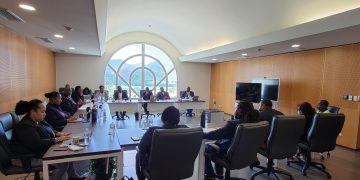Philipsburg, Sint Maarten – On Thursday, November 18, the Council of Ministers held a fruitful consultation meeting with the Committee for Civil Servants Unions (CCSU) and its members of the Windward Island Civil Servants Union (WICSU/PSU), Windward Islands Teachers Union (WITU), and Algemene Bond van Overheid en Overige Personeel (ABVO) union as well as a representative of NAPB. The meeting, which was chaired by CCSU Chair Mr. Rafael Boasman, served as an opportunity for the membership to be updated on the Constitutional Court’s verdict which confirmed government’s position surrounding the three temporary national ordinances and pose their questions concerning this. The three temporary national ordinances were issued by the government on July 1, 2020, to cut the employment benefits of civil servants, (semi) public sector workers and political authorities. This was one of the austerity measures imposed by the government of the Netherlands in exchange for COVID-19 liquidity support.
During the meeting, all parties also aimed to collectively establish the possibilities and effective steps for moving forward. As such, possible actions that the government can take in relation to the implementation of the temporary ordinances which were ratified on November 23rd, with retroactive effect on July 1, 2020, were aptly discussed.
Prime Minister Silveria Jacobs stated, “Momentarily, government’s financial standing still requires liquidity support for St. Maarten moving forward in order for the monthly obligations to be met. Due to the fact that the government of St. Maarten is complying with the measures, liquidity will continue. However, apart from the cost-cutting measures already taken by government, such as the reduction in mobile data usage, travel expenses and gas bons, we continue to seek and assess ways in which we can eliminate unnecessary expenditures so that public funds are used efficiently rendering the best results possible for the people of St. Maarten.”
Minister of Finance Ardwell Irion stated, “I look forward to further discussions with the union representatives as well as the reviews of the action points that were established during the meeting.”Moving forward, it was agreed that the CCSU membership will meet with the Council of Ministers every six months to receive updates concerning government’s financial status in addition to the agreed quarterly meetings. In order to accomplish this, government will implement indicators necessary to determine the country’s financial progress. The CCSU membership will also be able to meet with respective Ministers individually in regard to matters needing to be addressed where the temporary national ordinances are concerned. “The most positive outcome of this unique situation is the fact that both parties can come to the table, sit and discuss,” CCSU Chair Boasman remarked.


















